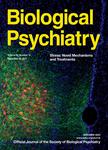版权所有:内蒙古大学图书馆 技术提供:维普资讯• 智图
内蒙古自治区呼和浩特市赛罕区大学西街235号 邮编: 010021

作者机构:Department of Psychiatry Yale University School of Medicine New Haven Connecticut United States Veterans Affairs Connecticut Healthcare System West Haven CT United States Department of Psychiatry University of Pennsylvania Perelman School of Medicine Philadelphia Pennsylvania United States Crescenz Veterans Affairs Medical Center Philadelphia Pennsylvania United States Department of Genetics Yale School of Medicine New Haven Connecticut United States Department of Neuroscience Yale School of Medicine New Haven Connecticut United States Department of Biomedical Informatics and Data Science Yale School of Medicine New Haven Connecticut United States Center for Brain and Mind Health Yale School of Medicine New Haven Connecticut United States
出 版 物:《Biological Psychiatry》 (Biol. Psychiatry)
年 卷 期:2025年第98卷第1期
页 面:46-55页
学科分类:0402[教育学-心理学(可授教育学、理学学位)] 0710[理学-生物学] 1002[医学-临床医学] 10[医学]
基 金:Pear Therapeutics Clearmind Medicine American Society of Clinical Psychopharmacology National Alliance for Research on Schizophrenia and Depression, NARSAD American Society of Clinical Psychopharmacology, ASCP National Institutes of Health, NIH, (U54 AA027989, RM1 HG011558, R01 AA026364, R01 DA037974, R01 DA058862, R01 DA012690, R01 AA030056, P50 AA012870, R21 CA252916, R01 AA011330) National Institutes of Health, NIH Brain and Behavior Research Foundation, BBRF, (41910, 27835) Brain and Behavior Research Foundation, BBRF U.S. Department of Veterans Affairs, VA, (I01 BX004820, 1I01CX001849) U.S. Department of Veterans Affairs, VA
主 题:Alcohol use disorder Coding variants Multiancestry Rare variants Substance use disorder Whole-exome sequencing
摘 要:Background: Alcohol use disorder (AUD) is a leading cause of death and disability worldwide. There has been substantial progress in identifying genetic variants that underlie AUD. However, whole-exome sequencing studies of AUD have been hampered by the lack of available samples. Methods: We analyzed whole-exome sequencing data of 4530 samples from the Yale-Penn cohort and 469,835 samples from the UK Biobank, which represent an unprecedented resource for exploring the contribution of coding variants in AUD. After quality control, 1750 African-ancestry (1142 cases) and 2039 European-ancestry (1420 cases) samples from the Yale-Penn and 6142 African-ancestry (130 cases), 415,617 European-ancestry (12,861 cases), and 4607 South Asian (130 cases) samples from the UK Biobank cohorts were included in the analyses. Results: We confirmed the well-known functional variant rs1229984 in ADH1B (p = 4.88 × 10−31) and several other variants in ADH1C. Gene-based collapsing tests that considered the high allelic heterogeneity revealed the previously unreported genes CNST (p = 1.19 × 10−6), attributable to rare variants with allele frequency −6), driven by the burden of both common and rare loss-of-function and missense variants. Conclusions: This study extends our understanding of the genetic architecture of AUD by providing insights into the contribution of rare coding variants, separately and convergently with common variants in AUD. © 2025 Society of Biological Psychiatry